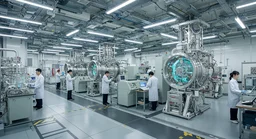AI Revolutionizes Precision Medicine: Transforming Healthcare with Personalized Treatment and Genomic Insights
332 views
Artificial Intelligence is quietly reshaping the contours of precision medicine, a field that marries cutting-edge technology with the quest for individualized healthcare solutions. As AI-driven tools refine data analysis, predict diseases with greater accuracy, and accelerate drug discovery, they promise to revolutionize how we approach treatment and prevention. Forecasts suggest that this burgeoning market will swell from $5.24 billion in 2025 to a staggering $24.11 billion by 2034, propelled by the growing demand for personalized medicine, the expansion of genomics research, and the proliferation of big data analytics. Yet, as transformative as this trajectory may seem, hurdles such as data privacy concerns, ethical dilemmas, and regulatory complexities remain steadfast challenges.

The Intersection of Innovation and Medicine: AI’s Role in Redefining Healthcare
The integration of artificial intelligence into precision medicine is not merely an incremental improvement; it is a seismic shift. By harnessing the power of machine learning, natural language processing, and deep learning algorithms, researchers and clinicians can delve deeper into the labyrinthine complexities of human biology. These technologies offer unprecedented capabilities in interpreting genomic data, diagnosing diseases, crafting personalized treatment plans, and even discovering novel drugs.
Consider oncology, where AI is making significant strides. Machine learning models can analyze genetic mutations and identify cancer subtypes with remarkable precision, paving the way for tailored therapies that target specific molecular pathways. Similarly, in neurology, AI-driven tools are being employed to predict the onset of neurodegenerative diseases, such as Alzheimer’s, years before symptoms manifest, enabling early interventions that could alter the course of the disease. The applications extend to infectious diseases, where AI algorithms analyze genomic and proteomic data to track pathogen evolution and predict outbreaks, a capability that has gained heightened relevance in the wake of global pandemics.
The involvement of industry giants such as Google, Microsoft, IBM, and Roche underscores the magnitude of this transformation. These companies are investing heavily in AI-powered platforms designed to interpret electronic health records, imaging data, and other complex datasets, thereby bridging the gap between raw information and actionable insights. Their collaboration with pharmaceutical firms like Pfizer and Novartis further highlights the synergistic potential of AI in drug discovery—a process historically plagued by high costs and lengthy timelines. By predicting drug efficacy and identifying potential adverse effects early in development, AI is streamlining the journey from laboratory to patient.
The Promise and Perils of Precision: Navigating Challenges in AI Integration
While the promise of AI in precision medicine is undeniable, its integration into healthcare systems is fraught with challenges that demand careful navigation. Chief among these is the issue of data privacy. The vast troves of genomic, proteomic, and electronic health record data required for AI algorithms are highly sensitive, raising concerns about unauthorized access and misuse. For instance, the same AI tools that can predict diseases might inadvertently expose vulnerabilities in data security, leaving patients susceptible to breaches that compromise their confidentiality.
Interoperability is another critical hurdle. Healthcare systems worldwide are fragmented, operating on disparate platforms that often lack the ability to communicate seamlessly. Integrating AI tools into these systems requires overcoming technical barriers that can stymie progress. Ethical considerations add yet another layer of complexity; questions surrounding algorithmic bias, informed consent, and equitable access to AI-driven treatments demand nuanced discussions and robust safeguards.
Regulatory frameworks, too, are struggling to keep pace with the rapid advancements in AI technology. While governments are initiating programs to promote AI in healthcare, the lack of standardized guidelines for its deployment creates uncertainty. For example, how should regulators assess the safety and efficacy of an AI algorithm used in diagnostics? What benchmarks should be established for its approval? These questions remain largely unresolved, highlighting the need for a collaborative approach involving policymakers, technologists, and healthcare providers.
A Glimpse into the Future: AI as the Architect of Personalized Medicine
Despite these challenges, the trajectory of AI in precision medicine is one of optimism and potential. The projected growth of the market—from $5.24 billion in 2025 to $24.11 billion by 2034—reflects not only technological advancements but also a paradigm shift in how we perceive and deliver healthcare. The rising demand for personalized treatment is a testament to the growing recognition that one-size-fits-all approaches are insufficient in addressing the complexities of human health.
As genomics research continues to expand, the availability of large-scale healthcare datasets will only increase, providing AI algorithms with richer sources of information to analyze. The convergence of AI with big data analytics promises to unlock insights that were previously unattainable, enabling breakthroughs in fields ranging from oncology to infectious diseases. Moreover, the involvement of leading technology and pharmaceutical companies ensures that innovation will be driven by both scientific rigor and commercial viability.
The future of precision medicine, however, will depend on our ability to address the challenges that accompany its growth. Striking a balance between technological innovation and ethical responsibility will be crucial in ensuring that AI-driven healthcare solutions are both effective and equitable. Regulatory frameworks must evolve to provide clear guidelines for AI integration, fostering an environment where innovation can thrive without compromising patient safety.
In essence, artificial intelligence is not merely a tool but an architect of a new era in medicine—one where treatments are tailored to the individual, diseases are predicted before they strike, and the boundaries of what is possible are continually expanded. As we stand on the cusp of this transformation, the question is not whether AI will redefine precision medicine, but how we will navigate the journey toward its full realization.


























